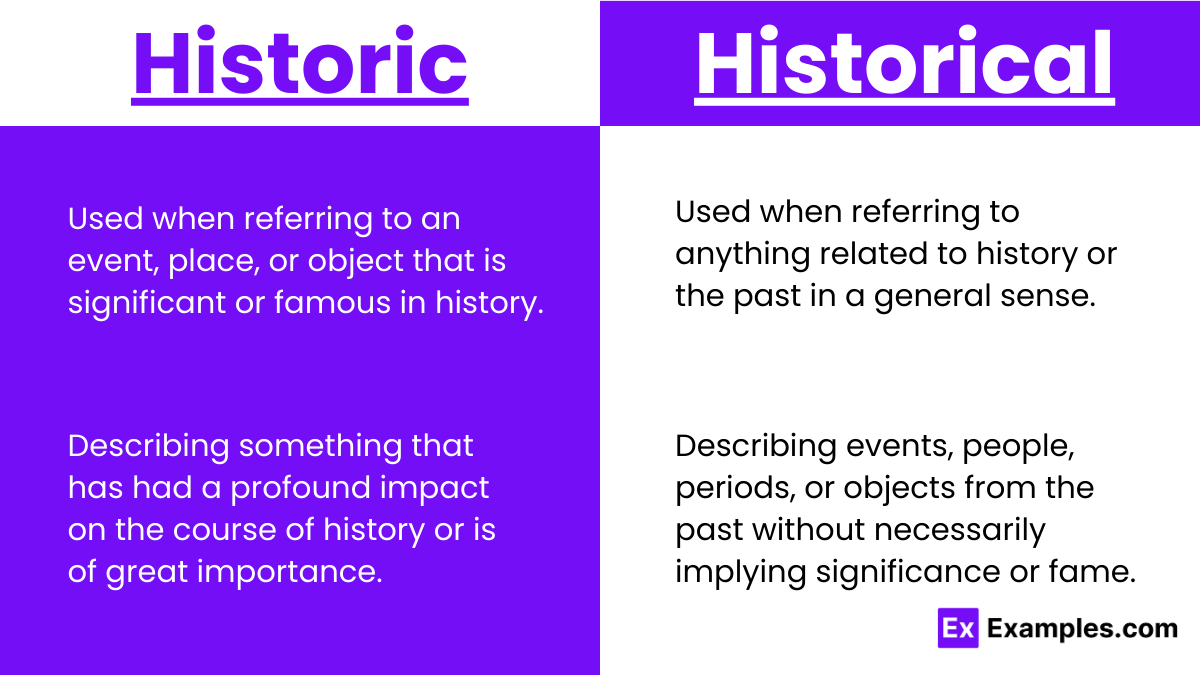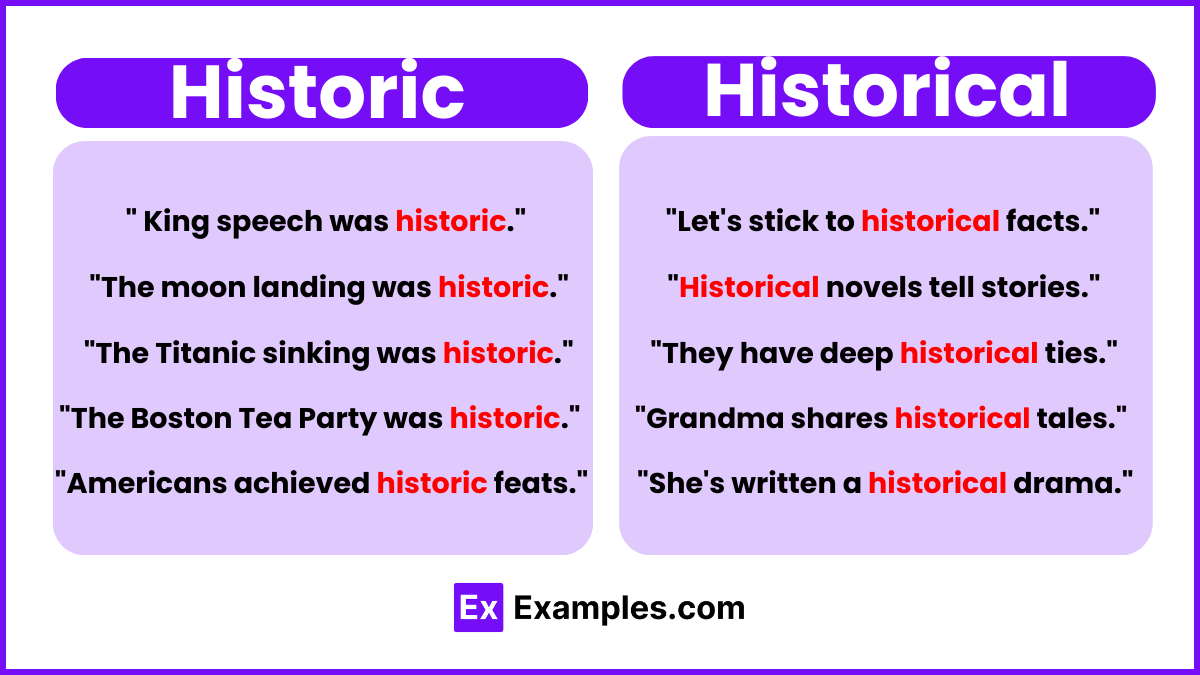Historic vs Historical – Meanings, Differences, Usage, Examples
Have you ever wondered about the difference between ‘historic’ and ‘historical’? Well, let’s unravel it! ‘Historic‘ refers to something significant or famous in history, like the moon landing. On the other hand, ‘Historical‘ simply describes anything related to history, whether it’s big or small, like an old book. So, while ‘historic’ shouts ‘big moment!’, ‘historical’ whispers ‘anything from the past.’ Remember, one is about importance, while the other covers everything from the past.”
Historic and Historical – Meanings
- Historic: It typically functions as an adjective. It refers to events, places, or objects that have had a profound impact on the course of history or are of great importance. For example, the signing of the Declaration of Independence is a historic event.
- Historical: It also serves as an adjective. It refers to anything related to history or the past. It can encompass a broader range of things, including events, people, periods, or objects from the past. For instance, a historical novel is a fictional story set in the past, and historical research involves studying past events and their significance.
Summary
How To Pronounce Historic and Historical
- Historic: Pronounced as /hɪˈstɔrɪk/.
- Historical: Pronounced as /hɪˈstɔrɪkəl/.
Differences Between Historic and Historical
| Aspect | Historic | Historical |
|---|---|---|
| Significance | Implies importance or significance in history | Does not necessarily imply importance |
| Usage | Typically used when referring to momentous events or places | Used in contexts related to the past in general |
| Application | Describes events, places, or objects of historical importance | Encompasses all things related to history |
| Temporal Context | Relates specifically to pivotal moments in history | Covers a broader spectrum of time periods |
| Adjective | Used as an adjective | Used as an adjective |
| Common Contexts | Found in discussions about pivotal moments or landmarks in history | Used in various contexts discussing the past |
How to Remember the Difference Between Historic and Historical
- “Historic” significance: Focus on the “ic” in “historic” to remember it stands for “important events” in history.
- Memorize “historic” as significant moments: Think of “historic” events as those that are historically significant or famous, like major discoveries or milestones.
- “Historical” covers all: Remember the “al” in “historical” stands for “all history,” indicating that it encompasses everything related to the past, whether big or small.
- Differentiate by importance: “Historic” highlights importance, while “historical” includes everything from the past, regardless of significance.
Tricks to Remember The Differences Between Historic and Historical
- Distinctive Sounds: Remember “historic” as “history’s highlight” for significant events.
- “Al” for All: Think of “historical” as covering “all of history,” including both major and minor events.
- Visualize Significance: Picture a spotlight on “historic” events, while “historical” is like a wide lens capturing all aspects of history.
- Create Mnemonics: Associate “historic” with “hit” for big moments and “historical” with “all” for comprehensive coverage.
When To Use Historic and Historical

-
Usage Of Historic
- Referring to an event, place, or object that is significant or famous in history.
- Describing something that has had a profound impact on the course of history or is of great importance.
- Emphasizing the uniqueness or importance of a particular moment or occurrence.
-
Usage of Historical
- Referring to anything related to history or the past in a general sense.
- Describing events, people, periods, or objects from the past without necessarily implying significance or fame.
- Discussing historical research, analysis, or narratives that explore the past.
How To Use Historic and Historical
- To use “historic” correctly: Identify events, places, or objects that hold significant importance in history.
- “Historic” is used to describe pivotal moments or landmarks in history that have left a lasting impact.
- To use “historical” appropriately: Consider contexts where anything related to the past is being discussed.
- “Historical” can be applied to a wide range of subjects, whether they are significant or not, as long as they pertain to history or the past.
Historic and Historical – Examples

Historic Examples
- The Battle of Gettysburg is a historic turning point in the American Civil War.
- The Taj Mahal is a historic monument known for its architectural beauty and cultural significance.
- The sinking of the Titanic remains a historic maritime disaster.
- The signing of the Declaration of Independence in 1776 was historic for the United States.
- The Wright brothers’ first flight at Kitty Hawk is a historic moment in aviation history.
Historical Examples
- Studying historical artifacts helps archaeologists understand ancient civilizations.
- Historical records provide insights into the daily lives of people in the past.
- The study of fossils contributes to our understanding of historical biodiversity.
- Historical documentaries offer perspectives on significant events throughout history.
- Historical landmarks serve as reminders of past achievements and struggles.
Synonyms for Historic and Historical
| Historic (significant events) | Historical (related to the past) |
|---|---|
| Momentous | Past-related |
| Pivotal | Antiquarian |
| Memorable | Ancient |
| Landmark | Bygone |
Exercises
- The _______________ significance of the ancient ruins was immediately apparent to the archaeologists.
- Our town has a rich _______________ heritage, with many old buildings and landmarks.
- The library contains a vast collection of _______________ documents dating back to the 18th century.
- Last night’s storm caused damage to several _______________ buildings in the downtown area.
- It was a truly _______________ moment when the treaty was signed, marking the end of the war.
Answers:
- Historic
- Historical
- Historical
- Historic
- Historic
FAQ’S
Is Historic the Same as Historical?
No, “historic” refers to significant events or places in history, while “historical” relates to anything related to the past, regardless of significance.
Is H Silent in Historical?
Yes, the “h” in “historical” is silent, so it’s pronounced as “i-stor-i-kuhl.”
An Historic or A Historic?
Both are acceptable. Use “an historic” before a vowel sound and “a historic” before a consonant sound.
Is a City Historic or Historical?
A city can be both historic and historical. “Historic” if it has significant events or places in its past, and “historical” if it’s related to the past in any way.
Is it Historical Sites or Historic Sites?
Both are correct, but “historic sites” refers to significant places in history, while “historical sites” can be any places related to the past.
A Historical or An Historical?
Both are acceptable. Use “a historical” before a consonant sound and “an historical” before a vowel sound.


